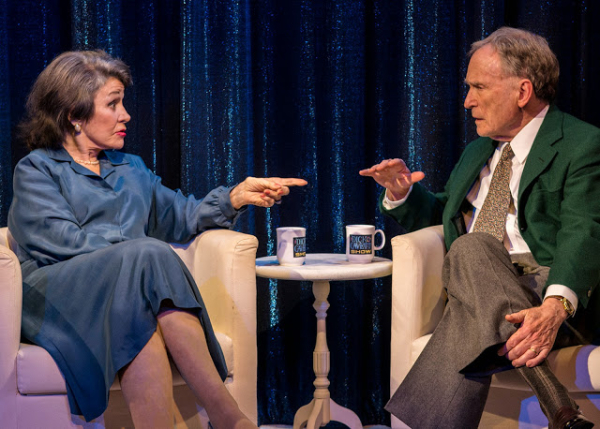Hellman v. McCarthy
Dick Cavett plays himself in Brian Richard Mori’s new drama about the feud between authors Lillian Hellman and Mary McCarthy.

(© Kim T. Sharp)
Perhaps the most meta experience onstage this season is the opportunity to watch Dick Cavett play a version of himself from 35 years ago in Hellman v. McCarthy, a new play by Brian Richard Mori at the Abingdon Theater Company. The 90-minute drama might be about the feud between the titular literary lionesses — Lillian and Mary — but it's the presence of the Emmy-winning talk-show host that is simultaneously the most noteworthy and strange element in Jan Buttram's production.
The long-standing disagreement between Hellman, the writer of such plays as The Little Foxes and The Children's Hour, and author/literary critic McCarthy ignited on Cavett's PBS talk show in 1979. McCarthy, here played by Marcia Rodd, while on Cavett’s show to promote her latest novel, famously told him that every word Hellman (Roberta Maxwell) said was a lie, including "and" and "the." This led to the sickly Hellman suing McCarthy for a cool million in a libel suit that only got settled (and dropped) when Hellman died in 1984.
What playwright Mori gives us, unfortunately, is only an outline of how the years played out, and not a very dramatic one at that. Truman Capote, as Cavett notes at the beginning of the play, called this style "reportage" — meaning, an account of the news. While this can certainly work in journalism, in theater it feels decidedly skeletal. Mori observes the goings-on without providing much in the way of commentary or action — aside from an imagined meeting, the women never confront each other and merely communicate through their lawyers. Tertiary characters, like Hellman's gay man-servant Ryan (played by Rowan Michael Meyer), distract from the proceedings, especially when their dialogue elicits more sympathy than the principals'. Buttram's staging, on a bright white set by Andrew Lu, is particularly static, including a whole lot of sitting.
Rodd and Maxwell are both uniquely sympathetic in their own way, and while the domineering Rodd blows past everyone onstage with an appropriate brusqueness, it's Maxwell's quiet agony that's most compelling to watch. Cavett's presence in the play is simultaneously fascinating and incredibly distracting, especially since Mori's text is constructed as an episode of The Dick Cavett Show. Cavett wanders around the stage in a green sports coat (costumes are by Jane Greenwood), carrying note cards, and talking in what's supposed to be an extemporaneous fashion, except that everything appears to be meticulously scripted, right down to "and," and "the." In watching the host play himself, you can't help but wish he just snapped out of his character to casually tell the audience what actually went down.
There is a brief moment where this does happen, at the very end of the show. After the bows, Cavett drops the character he's playing — Dick Cavett, 1979-1984 — to play Dick Cavett 2014 and takes a few questions from the audience. It's here where history is actually illuminated. When asked whether or not he actually believed that McCarthy was a liar, he looked straight at the person who asked the question and replied, "Do you believe Hitler was touchy?" His candor sheds far more clarity on this minor cultural sensation than the previous 90 minutes. "It's weird playing myself," Cavett deadpanned as he strolled offstage. And it is for us, too.








